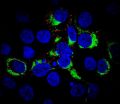(Press-News.org) Researchers at University of California, San Diego School of Medicine report that people living with depression, anxiety or other mental health conditions are twice as likely to have tried e-cigarettes and three times as likely to be current users of the controversial battery-powered nicotine-delivery devices, as people without mental health disorders.
They are also more susceptible to trying e-cigarettes in the future in the belief that doing so will help them quit, the scientists said. The FDA has not approved e-cigarettes as a smoking cessation aid.
The study will be published in the May 13 online issue of Tobacco Control.
"The faces of smokers in America in the 1960s were the 'Mad Men' in business suits," said lead author Sharon Cummins, PhD, assistant professor in the Department of Family and Preventive Medicine. "They were fashionable and had disposable income. Those with a smoking habit today are poorer, have less education, and, as this study shows, have higher rates of mental health conditions."
By some estimates, people with psychiatric disorders consume approximately 30 to 50 percent of all cigarettes sold annually in the U.S.
"Since the safety of e-cigarettes is still unknown, their use by nonsmokers could put them at risk," Cummins said. Another concern is that the widespread use of e-cigarettes could reverse the social norms that have made smoking largely socially unacceptable.
The study shows that smokers, regardless of their mental health condition, are the primary consumers of the nicotine delivery technology. People with mental health disorders also appear to be using e-cigarettes for the same reasons as other smokers – to reduce potential harm to their health and to help them break the habit.
"So far, nonsmokers with mental health disorders are not picking up e-cigarettes as a gateway to smoking," Cummins said.
The study is based on a survey of Americans' smoking history, efforts to quit and their use and perceptions about e-cigarettes. People were also asked whether they had ever been diagnosed with an anxiety disorder, depression or other mental health condition.
Among the 10,041 people who responded to the survey, 27.8 percent of current smokers had self-reported mental health conditions, compared with 13.4 percent of non-smokers; 14.8 percent of individuals with mental health conditions had tried e-cigarettes, and 3.1 percent were currently using them, compared with 6.6 percent and 1.1 percent without mental health conditions, respectively.
In addition, 60.5 percent of smokers with mental health conditions indicated that they were somewhat likely or very likely to try e-cigarettes in the future, compared with 45.3 percent of smokers without mental health conditions.
"People with mental health conditions have largely been forgotten in the war on smoking," Cummins said. "But because they are high consumers of cigarettes, they have the most to gain or lose from the e-cigarette phenomenon. Which way it goes will depend on what product regulations are put into effect and whether e-cigarettes ultimately prove to be useful in helping smokers quit."
INFORMATION:
Co-authors of this study include Shu-Hong Zhu and Anthony C. Gamst, Department of Family and Preventive Medicine, UCSD; Gary J. Tedeschi, UC San Diego Moores Cancer Center; and Mark G. Myers, Department of Psychiatry, UCSD.
Funding for this research came from the National Cancer Institute (grant U01 CA154280).
E-cigarettes and mental health
Persons with mental health conditions found more likely to use nicotine-delivery devices
2014-05-13
ELSE PRESS RELEASES FROM THIS DATE:
Novel target found for chemotherapy-resistant leukemia cells
2014-05-13
Researchers at Children's Hospital Los Angeles have discovered that by targeting a particular receptor, chemotherapy-resistant cancer cells can be killed in an acute form of childhood leukemia, offering the potential for a future treatment for patients who would otherwise experience relapse of their disease.
Nora Heisterkamp, PhD, and colleagues at The Saban Research Institute of Children's Hospital Los Angeles have discovered that by targeting the B-cell activating receptor (BAFF-R), chemotherapy-resistant precursor B acute lymphoblastic leukemia cells (pre-B ALL) can ...
Older, sicker men with early-stage prostate cancer do not benefit from aggressive treatment
2014-05-13
Treating older men with early-stage prostate cancer who also have other serious underlying health problems with aggressive therapies such as surgery or radiation therapy does not help them live longer and, in fact, can be detrimental, according to a study by UCLA researchers.
The study followed the cases of more than 140,500 men aged 66 and older diagnosed with early-stage prostate cancer between 1991 and 2007 from the Surveillance, Epidemiology and End Results (SEER) Medicare database. Men who also suffered from multiple major medical conditions such as a history of ...
Study: Former prisoners, parolees turn to emergency departments for care
2014-05-12
AURORA, Colo. (May 12, 2014) – Being released from prison or jail is a difficult time for the millions of Americans returning to their communities from correctional facilities. Add to the list of challenges a high risk of winding up in the emergency department or the hospital. That's according to a new study from the University of Colorado School of Medicine.
The study, published in the Journal of General Internal Medicine, provides support for efforts to improve access to insurance and readily available health care for this vulnerable group.
"This study comes at a ...
Researchers find new molecule to treat asthma
2014-05-12
La Jolla, Calif., May 12, 2014 -- A new study carried out by researchers at Sanford-Burnham Medical Research Institute (Sanford-Burnham), the Max Planck Institute for Colloids and Interfaces (Germany), the Free University of Berlin (Germany), UC San Diego, and Shinshu University (Japan) has identified a novel molecule that prevents T-cells from orchestrating asthma brought on by allergens. The findings, published on May 12 in Proceedings of the National Academy of Sciences (PNAS), show promise for a new potent therapeutic agent to treat asthma, a chronic disease affecting ...
JAX researchers identify potential therapeutic target for wound-healing and cancer
2014-05-12
A Jackson Laboratory research team led by Professor Lenny Shultz, Ph.D., reports that a protein involved in wound healing and tumor growth could be a potential therapeutic target.
In one of nature's mixed blessings, the mechanisms that work to heal cuts and wounds, rebuilding damaged cells, can also go out of control and cause cancer. But understanding those mechanisms could lead to new ways of stimulating healing in wound patients and dialing back cancerous proliferation.
An inactive rhomboid protease, iRhom2, is normally a short-lived protein that controls a cascade ...
Airborne radar surveys and data-based models indicate West Antarctic Ice Sheet collapse is underway
2014-05-12
National Science Foundation- (NSF) funded researchers at the University of Washington have concluded that Antarctica's fast-moving Thwaites Glacier will likely disappear in a matter of centuries, potentially raising sea level by more than a half-a-meter (two feet).
Data gathered by NSF-funded airborne radar, detailed topography maps and computer modeling was used to make the determination.
The glacier acts as an ice dam, stabilizing and regulating movement toward the sea of the massive West Antarctic Ice Sheet. The ice sheet contains enough ice to cause another 3 to ...
Henry Ford researchers identify genetic factors that may aid survival from brain cancer
2014-05-12
DETROIT – A Henry Ford Hospital research team has identified specific genes that may lead to improved survival of glioblastoma, the most common and deadly form of cancerous brain tumor.
The molecular data is expected to aid further research into genes that either help or impede the survival of patients diagnosed with the tumor, which can invade and rapidly grow in any part of the human brain.
"Studies such as ours that help define molecular alterations associated with short-term survival likely will help define the reasons why our current treatments don't succeed in these ...
Researchers find a new gene expression mechanism of PRRS virus
2014-05-12
MANHATTAN, Kan. — A collaborative study involving Kansas State University researchers has discovered a new gene expression mechanism in porcine reproductive and respiratory syndrome, or PRRS, virus — an important swine pathogen that costs the U.S. pork industry more than $600 million a year. The discovery provides a new avenue for scientists to explore strategies to control and prevent the disease.
Ying Fang, Ph.D., associate professor of diagnostic medicine and pathobiology at Kansas State University, led a study that looked at the unique gene expression mechanism of ...
Hospitals ranked on complications after hip and knee replacement surgeries
2014-05-12
With an aging population comes an increase in hip and knee joint replacement surgeries, totaling almost one million procedures per year in the United States. To provide better information on the outcomes of these surgeries, help inform patient choice, and improve the quality of the nation's hospitals, a team of Yale School of Medicine researchers have developed a measure for hospitals based on the complications following their patients' hip and knee replacements.
The team published an article in the May issue of the Journal of Bone and Joint Surgery showing there are ...
Dartmouth scientists identify genetic blueprint for cancerous tumors of the appendix
2014-05-12
Using next generation DNA sequencing, Dartmouth scientists have identified potentially actionable mutations in cancers of the appendix. Their study, "Molecular Profiling of Appendiceal Epithelial Tumors Using Massively Parallel Sequencing to Identify Somatic Mutations," was published in the journal Clinical Chemistry today. When specific mutations for a cancer type are identified, patients can be treated with chemotherapy or other targeted agents that work on those mutations.
Little is known about the molecular biology of two types of appendix tumors, low-grade appendiceal ...
LAST 30 PRESS RELEASES:
LSU LCMC Health Cancer Center researchers uncover key immune differences in triple-negative breast cancer
University of Cincinnati study advances understanding of pancreatic cancer treatment resistance
An integrated approach to cybersecurity is key to reducing critical infrastructure vulnerability
Probing new mechanisms of depression and anxiety
What can psychedelics teach us about the sense of self?
An integrated monolithic synaptic device for C-tactile afferent perception and robot emotional interaction
‘Zap-and-freeze’ technique successfully used to watch human brain cell communication
Prebiotic in diet linked to less impulsivity in gambling rats with TBI
Gestational weight gain and pregnancy outcomes after GLP-1 receptor agonist discontinuation
Increasing postpartum use of GLP-1 receptor agonists
Patients who discontinued GLP-1s had more weight gain, complications during pregnancy
Untreated sleep apnea raises risk of Parkinson’s, study finds
Prevalence, characteristics, and genetic architecture of avoidant/restrictive food intake phenotypes
Cardiometabolic parameter change by weight regain on tirzepatide withdrawal in adults with obesity
US burden of disorders affecting the nervous system
Social media detox and youth mental health
One in two people in the US is affected by a neurological disease or disorder
Colliding ribosomes signal cellular stress
New doctoral network aims to establish optical vortex beams as key technology for advanced light-matter interaction
Vegan diet—even with ‘unhealthy’ plant-based foods—is better for weight loss than Mediterranean diet, finds new study
JMIR Publications joins STM and integrates STM’s Integrity Hub
NCSA receives honors in 2025 HPCwire Readers’ and Editors’ Choice Awards
New study reveals that differences between parent and child views best assess quality of life after pediatric liver transplant
Shapeshifting cancers’ masters, unmasked
Pusan National University researchers develop model to accurately predict vessel turnaround time
Nanowire breakthrough reveals elusive astrocytes
Novel liver cancer vaccine achieves responses in rare disease affecting children and young adults
International study finds gene linked with risk of delirium
Evidence suggests early developing human brains are preconfigured with instructions for understanding the world
Absolutely metal: scientists capture footage of crystals growing in liquid metal
[Press-News.org] E-cigarettes and mental healthPersons with mental health conditions found more likely to use nicotine-delivery devices



